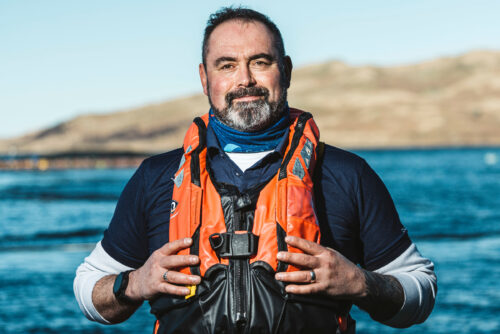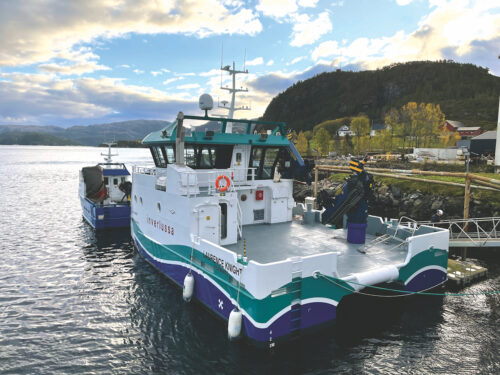Salmon farmer Scottish Sea Farms has taken delivery of a hybrid power workboat, the first vessel of its kind to be used in Scotland’s aquaculture sector.
The 15m catamaran, “Laurence Knight”, was commissioned by Mull-based boat operator Inverlussa Marine Services from Norwegian yard Moen Marin and goes into service this month on Scotland’s west coast.
The boat, which will run primarily on its batteries, marks a “massive milestone” in both carbon reduction and cost savings, said Inverlussa Managing Director Ben Wilson.
“There are similar hybrid vessels in Norway and we thought it was the right time to introduce this technology to our Scottish customers, who are committed to lowering their environmental impact,” he said.
Five to six hours without recharging
The boat can perform on-farm duties for five to six hours without recharging its batteries from either of the two generators on board.
This means the generators do not need to be running when the boat is tied up alongside a salmon pen, assisting with a harvest or a net installation, for instance.
And with no demand for an overnight generator, noise will be reduced, as well as diesel fuel consumption and the vessel’s carbon footprint.
For Scottish Sea Farms, the new vessel will help achieve CO2 savings of around 234 tonnes a year, as well as potentially cut fuel costs by up to 50 per cent.
The batteries, with a total capacity of 244kW hours, can drive cranes and all other energy requirements, including steaming back and forth from the shore. As soon they need recharging, the generators kick in automatically, and they can also be recharged from shore power.
With the new boat, data can be collected from the batteries for analysis back on shore. The technology allows Scottish Sea Farms to manage every individual cell within the battery pack to get the most efficient use out of it.
Life expectancy of 16 years
The batteries have a typical life expectancy of 16 years and are also 100 per cent recyclable. The water used to cool the batteries is recycled to help heat the four cabins.
Scottish Sea Farms Regional Director for the Mainland Innes Weir said the boat will instil confidence in the future of hybrid technology across the business.

“The system we have at Spelve is to pick up anything other than feeding fish. As soon as we need to feed, we turn the generator on.”
“If we can operate a hybrid system that is completely electric, with generators just used for recharging batteries, we can roll it out across our estate, on the barges and other energy rich areas we want to hybridise.”
Wilson added: “I think this type of vessel is going to become more common in the Scottish salmon farming sector as producers look for greener solutions. It’s an exciting project and we’re looking forward to getting it going.”



